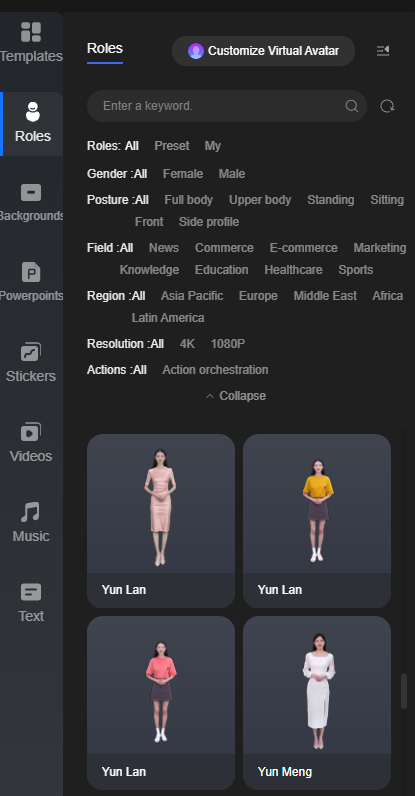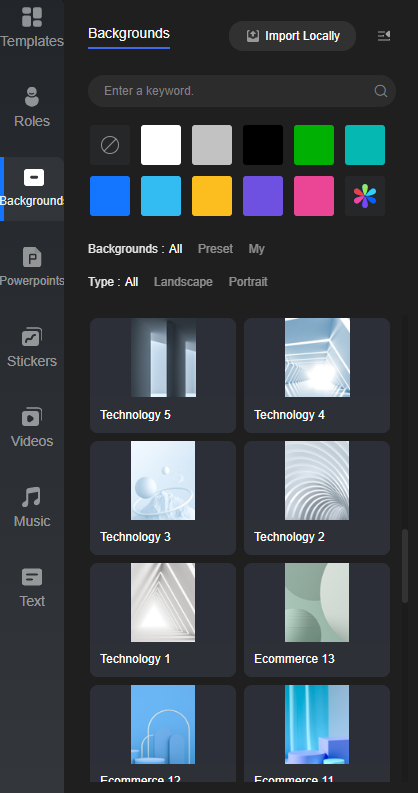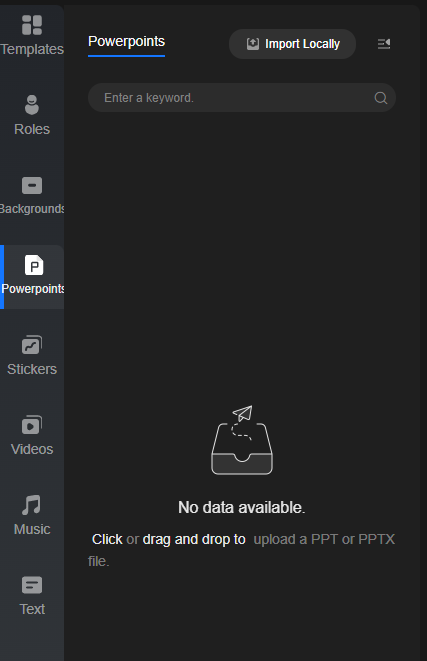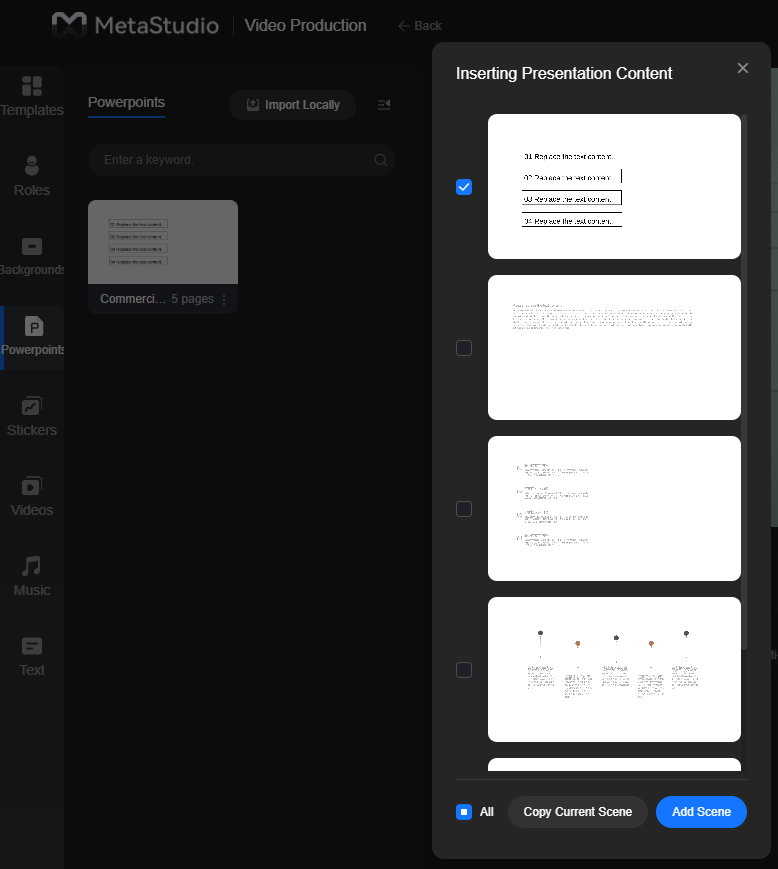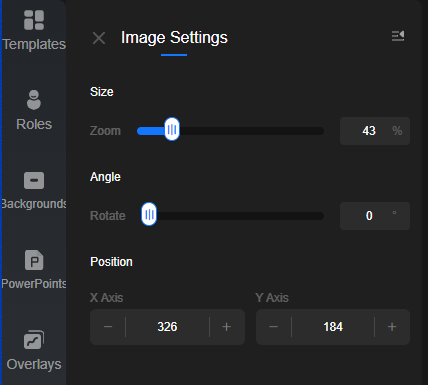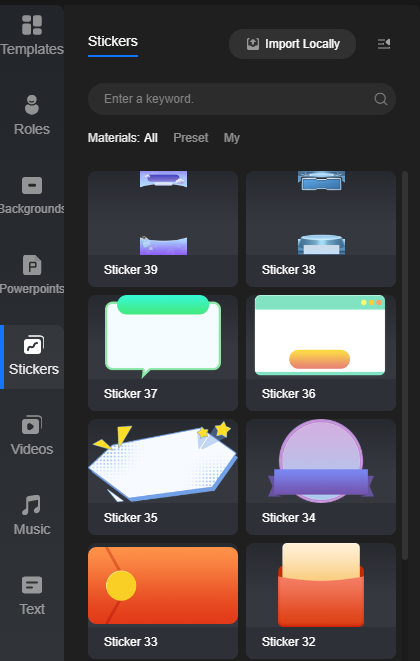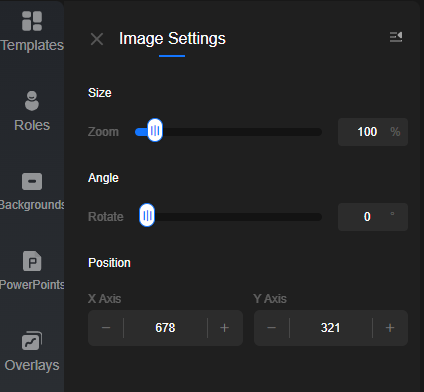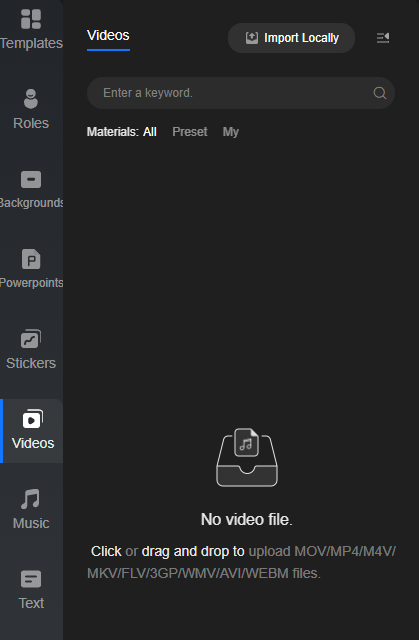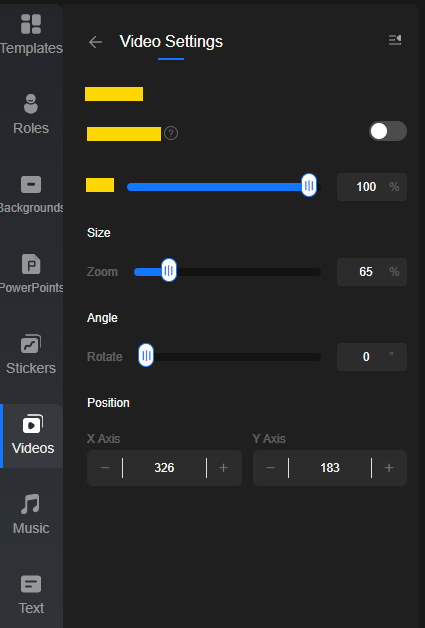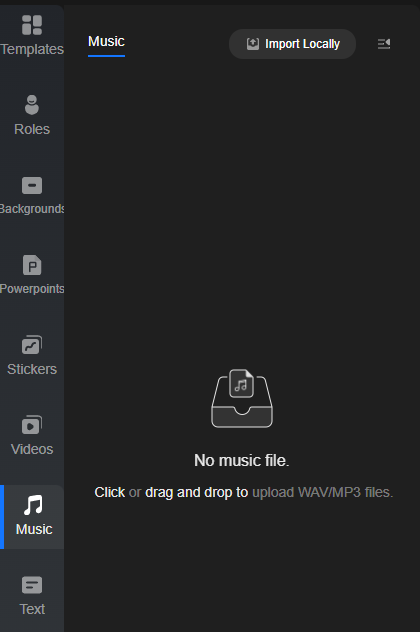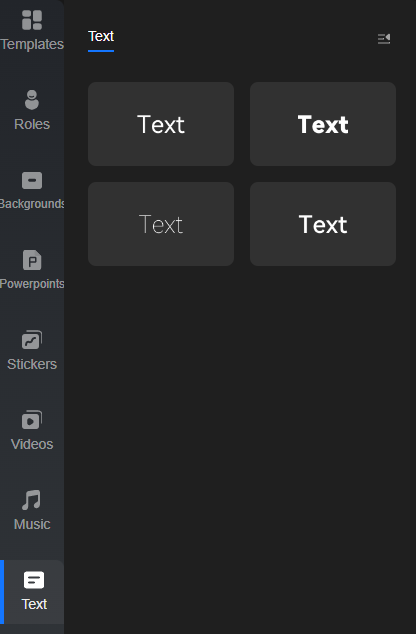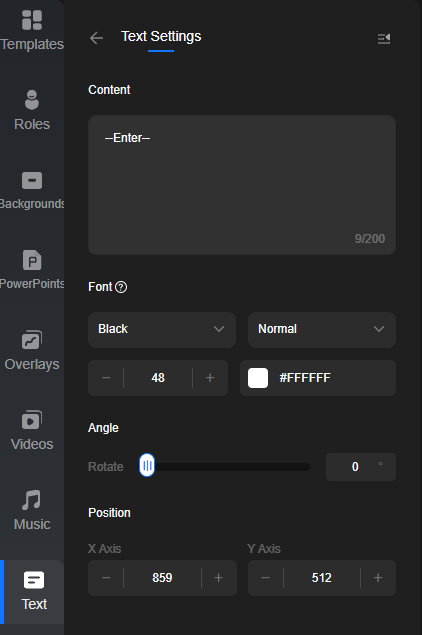Common Configuration for Video Production
On the Video Production page, you can overlay materials, such as roles, backgrounds, PowerPoints, overlays, videos, music, and text on a video. This section describes the operation procedure of each material type.

If the pixel of an uploaded image is too high, solve the problem by referring to What If the Pixel of an Uploaded Image Is Too High?
Roles
Figure 1 shows the Roles area.
Table 1 describes the Roles area.
|
GUI Element |
Description |
|---|---|
|
Customize Virtual Avatar |
Click Customize Virtual Avatar to go to the avatar creation page. See Creating a Virtual Avatar Customization Task. |
|
|
By default, two columns of virtual avatars are displayed in the Roles area. After you click |
|
|
You can enter a virtual avatar name in the search box for an exact search. Example: yun lan |
|
|
Icon of refreshing. If there are keywords, the virtual avatar display is refreshed based on the keywords. If no, the default display will be used. |
|
Filter criteria |
You can filter and display virtual avatars by role, gender, posture, field, region, resolution, and action. |
|
List of virtual avatars |
By default, all virtual avatars are displayed. Click a virtual avatar image. The image will be automatically applied to all scenes in the video draft. In the video preview area, you can perform the following operations on different overlays: Bring Forward ( |
Table 2 can apply to the role selected in the preview area.
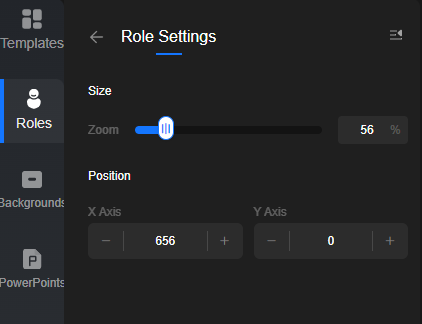
Backgrounds
Figure 3 shows the Backgrounds area. An uploaded background image cannot be modified. You can modify it only on the local PC and then upload the new one to the console.
Table 3 describes the Backgrounds area.
Table 4 can apply to the background image selected in the preview area.
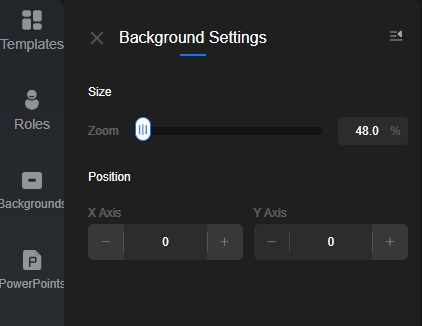
|
Item |
Parameter |
Description |
|---|---|---|
|
Size |
Zoom |
A background image can be zoomed in or out for preview. The background image cannot be smaller than the preview area; it must cover or extend beyond its boundaries. If the image is larger, only the content within the preview area will be shown. |
|
Position |
X Axis |
|
|
Y Axis |
PowerPoints
Figure 5 shows the PowerPoints area. An uploaded PowerPoint file cannot be modified. You can modify it only on your local device and then upload the new one to the console.
Table 5 describes the PowerPoints area.
|
GUI Element |
Description |
|---|---|
|
Import Locally |
Click Import Locally to upload a PPTX, PPT, or PDF file from the PC. You can also drag a file from the PC to the file list area for upload. Constraints:
|
|
|
By default, two columns of files are displayed in the PowerPoints area. After you click |
|
|
You can enter a file name in the search box for an exact search. Example: sales guide |
|
File list |
By default, all files are displayed. |
|
Viewing files |
If you move the pointer over a file, |
|
Inserting a file |
If you move the pointer over a file, In the video preview area, you can perform the following operations on different overlays: Bring Forward ( |
|
Deleting a file |
Click
|
After the file is uploaded, perform the following operations:
- In the file list of the PowerPoints area, click the uploaded file to go to the dialog box shown in Figure 6.
- Select the slide to be inserted or select all slides, and click Copy Current Scene or Add Scene to add scenes to the video draft.
One scene will be generated for each inserted PowerPoint slide. You can choose whether to modify the scene.
Specifically:
- Copy Current Scene: A new scene will be generated, including the selected slide and all video materials (such as the virtual avatar and background) of the selected scene.
If there are multiple scenes before the slide is inserted, you need to select the desired scene. Then insert the slide into the selected scene.
- Add Scene: A new scene will be generated, including the selected slide and the virtual avatar and background of the selected scene. However, other video materials of the selected scene will not be retained in the new scene.
If there are multiple scenes before the slide is inserted, you need to select the scene with the desired virtual avatar and background. Then insert the slide into the selected scene.
- Copy Current Scene: A new scene will be generated, including the selected slide and all video materials (such as the virtual avatar and background) of the selected scene.
- After all slides are inserted, customize the scene by referring to Video Production.
You can also set the PowerPoint slide overlaid as an image on the preview area, as shown in Figure 7.
Table 6 Image settings Item
Parameter
Description
Size
Zoom
A PowerPoint slide overlaid as an image can be zoomed in or out for preview.
Angle
Rotate
The PowerPoint slide image can be rotated by up to 360 degrees.
Position
X Axis
You can adjust the position of the image in the preview area.
Y Axis
Overlays
Figure 8 shows the Overlays area.
- An uploaded image overlay cannot be modified. You can modify it only on your local device and then upload the new one to the console.
- If a GIF is overlaid, you can preview the animation.
Table 7 describes the Overlays area.
|
GUI Element |
Description |
|---|---|
|
Import Locally |
Click Import Locally to upload a PNG, JPG, JPEG, BMP, or GIF image. You can also drag an image from the PC to the image list area for upload. |
|
|
By default, two columns of images are displayed in the Overlays area. After you click |
|
|
You can enter an image name in the search box for an exact search. Example: tips |
|
Filter criteria |
Images can be filtered and displayed by My or Preset. |
|
Image list |
By default, all images are displayed. |
|
Viewing an image overlay |
If you move the pointer over an image, |
|
Overlaying an image |
If you move the pointer over an image, In the video preview area, you can perform the following operations on different overlays: Bring Forward ( |
You can also set the image overlay in the preview area, as shown in Figure 9.
|
Item |
Parameter |
Description |
|---|---|---|
|
Size |
Zoom |
An image overlay can be zoomed in or out for preview. |
|
Angle |
Rotate |
The image overlay can be rotated by up to 360 degrees. |
|
Position |
X Axis |
You can adjust the position of the image overlay in the preview area. |
|
Y Axis |
Videos
Figure 10 shows the Videos area.
Note:
- An uploaded video overlay cannot be modified. You can modify it only on your local device and then upload the new one to the console.
- The aspect ratio of a video overlay is locked. You can adjust its width and height only on your local device and then import the new one.
- A video overlay cannot exceed 30 minutes.
Table 9 describes the Videos area.
|
GUI Element |
Description |
|---|---|
|
Import Locally |
Click Import Locally to upload an MOV, MP4, M4V, MKV, FLV, 3GP, WMV, AVI, or WebM video file from your local device. You can also drag a video from your local device to the video list area for upload.
NOTE:
On the MetaStudio console:
|
|
|
By default, two columns of videos are displayed in the Videos area. After you click |
|
|
You can enter a video name in the search box for an exact search. Example: marketing video |
|
Filter criteria |
Videos can be filtered and displayed by My or Preset. |
|
Video list |
By default, all videos are displayed. |
|
Watching a video |
If you move the pointer over a video, |
|
Overlaying a video |
If you move the pointer over a video, If the video overlay is with sound, the sound can be heard after the video is overlaid. You can also adjust the volume by referring to Table 10. After video compositing, you can hear both the script read by the virtual avatar and the sound of the video overlay. In the video preview area, you can perform the following operations on different overlays: Play Once ( |
You can set the video overlay in the preview area by referring to Table 10, as shown in Figure 11.
|
Item |
Parameter |
Description |
|---|---|---|
|
Playback Settings |
Complete Video Playback |
Whether to play an entire video overlay. This function is disabled by default.
|
|
Volume |
Volume of the video overlay, in percentage. 0 means muting the video overlay. |
|
|
Size |
Zoom |
Zoom ratio of the video overlay. |
|
Angle |
Rotate |
Video rotation angle, which can be up to 360 degrees. |
|
Position |
X Axis |
X-axis position of the video overlay. |
|
Y Axis |
Y-axis position of the video overlay. |
Music
Figure 12 shows the Music area.
Table 11 describes the Music area.
|
GUI Element |
Description |
|---|---|
|
Import Locally |
Click Import Locally to upload a WAV or MP3 music file from your local device. You can also drag a music file from your local device to the music file list area for upload. |
|
|
Clicking |
|
Music list |
By default, all music files are displayed. |
|
Listening to music |
If you move the pointer over a music file, |
|
Inserting music |
If you move the pointer over a music file, |
|
Removing background music |
If you want to remove the background music of the video, you can click Do Not Apply in the upper right corner of the music file. |
Text
Figure 13 shows the Text area.
Table 12 describes the Text area.
|
GUI Element |
Description |
|---|---|
|
|
By default, two columns of text are displayed in the Text area. After you click |
|
Text list |
Supported text fonts: HarmonyOS normal, HarmonyOS bold, HarmonyOS light, and HarmonyOS medium black. |
|
Inserting text |
If you move the pointer over a piece of text, In the Text Settings area on the left, set the text content, font, rotation angle, and position in the preview area, as shown in Figure 14. In the video preview area, you can perform the following operations on different overlays: Bring Forward ( |
Feedback
Was this page helpful?
Provide feedbackThank you very much for your feedback. We will continue working to improve the documentation.See the reply and handling status in My Cloud VOC.
For any further questions, feel free to contact us through the chatbot.
Chatbot

